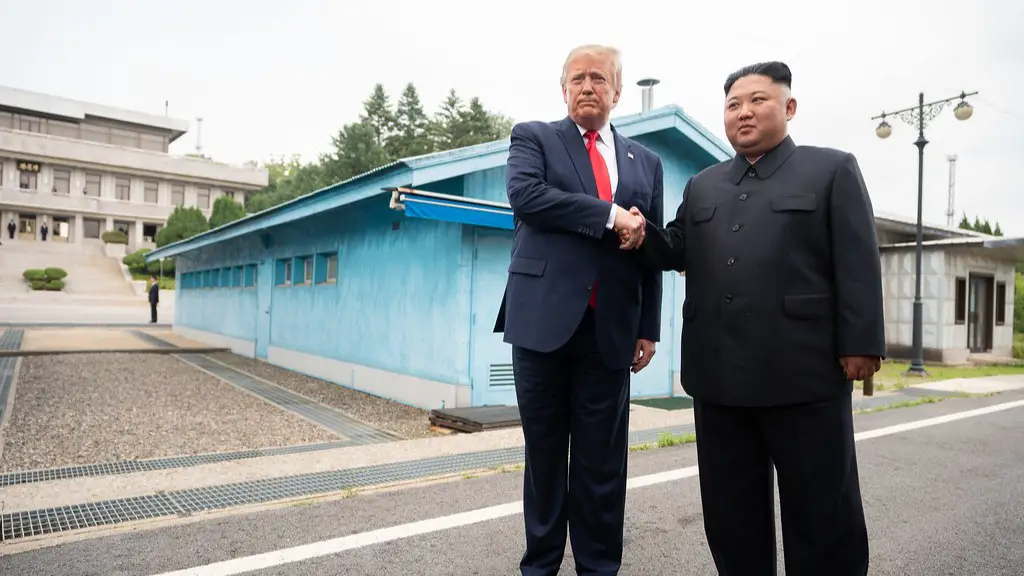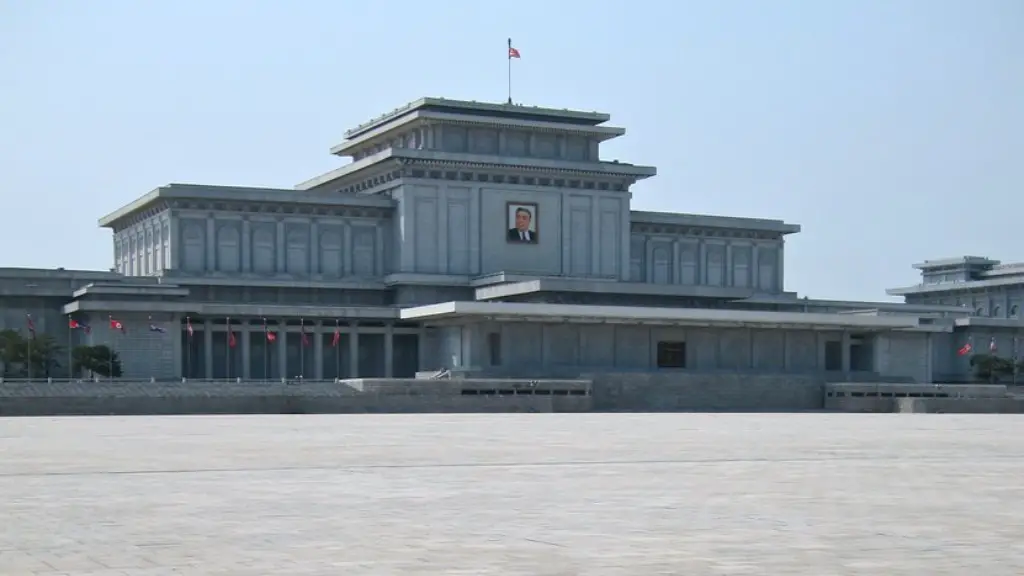The tension between the United States and North Korea have been steadily rising in recent years, and that has a lot of people asking the question – are the US and North Korea allies or enemies?
The answer depends on how one defines an ally. While technically the two countries may not be considered “allies” due to the diplomatic estrangement between them, the US and North Korea do have a few things in common. For instance, both countries are members of the United Nations and North Korea is also a signatory to the Nuclear Non-Proliferation Treaty.
From an economic perspective, North Korea has remained relatively isolated from the US and other industrialized countries. North Korea has traditionally lacked the infrastructure and resources necessary to participate in global trade, relying heavily on its own natural resources and labor to sustain itself. This is in stark contrast to the US, which has a far-reaching economy and has actively sought to expand its global reach through exports and imports of goods and services.
When it comes to national security, the US and North Korea have very different agendas. The US has long-sought to maintain a strong presence in the Asia-Pacific region as well as deter potential threats from North Korea. On the other hand, North Korea largely focuses its efforts on protecting itself from outside aggression and seeking to improve the quality of life for its citizens. Ultimately, while the US and North Korea may have slightly overlapping security interests, their views on foreign policy and international relations are incompatible.
The US and North Korea do, however, share a few common interests. For instance, both countries have been involved in negotiations for denuclearization on the Korean peninsula. In addition, both have expressed a desire to see a peaceful resolution to the ongoing conflict between the two countries. Yet, despite these shared interests, the US and North Korea remain locked in a diplomatic stand-off and are unlikely to form any sort of meaningful alliance in the near future.
Agreements Between The US And North Korea
Despite the lack of official ties between the two countries, the US and North Korea have engaged in several agreements throughout the years. These agreements were largely aimed at regulating weapons of mass destruction and preventing their development and use. In 1994, the US and North Korea signed the Agreed Framework, which established a number of restrictions and safeguards on both countries’ nuclear weapons programs. In addition, the two countries signed the 2005 Six-Party Talks Framework Agreement, in which North Korea agreed to abandon all its nuclear weapons and related programs in exchange for aid and security assurances.
Despite these agreements, however, relations between the two countries have remained relatively tense. In 2017, the US imposed new economic sanctions on North Korea, which led to a marked increase in tensions and sparked fears of a potential military conflict. In response to these sanctions, North Korea has continued to develop its nuclear weapons program and test various ballistic missiles, and it has condemned the US for its aggressive stance towards the country.
Despite the disagreements between the two countries, there have been numerous attempts to reduce tensions and build a more constructive relationship. In 2018, President Trump became the first sitting US president to meet with North Korean ruler Kim Jong Un, and the two leaders met again in 2019. While the two leaders have expressed optimism about the chances of improving relations between the US and North Korea, it still remains unclear if the two countries can truly rely on each other.
International Perspective On The US And North Korea
Most of the international community has viewed the US and North Korea’s relationship with a sense of trepidation. This is largely due to the uncertainty surrounding North Korea’s nuclear program and its unpredictable nature. In addition, many countries have expressed concerns about the US’s hawkish stance towards North Korea, which has been seen as overly aggressive and destabilizing.
Nevertheless, many countries believe that the US and North Korea should strive for dialogue and try to find a way to reach a diplomatic solution to their issues. For instance, China has been pushing both sides to de-escalate tensions, and South Korea has called for a “peace regime” on the Korean peninsula. Other countries including Russia, Japan, and the European Union have also expressed their willingness to facilitate discussions between the two countries.
In light of these efforts, the US and North Korea have made some progress in their relationship in recent years, with both countries taking steps towards a more constructive dialogue. However, the two countries remain far from becoming true allies and it remains to be seen if they will ever be able to do so.
US Relations With North Korea In Perspective
When examining the US-North Korean relationship, it is clear that the two countries remain far from becoming true allies. While the US and North Korea have some overlapping interests and have made several attempts to improve their relationship through negotiations, they have yet to truly overcome their differences and create an effective alliance.
At the same time, it is important to keep in mind that the US and North Korea have different security and development goals and often find themselves in disagreement. These differences have created a certain level of distrust between the two countries, and it will likely take some time for the two countries to build a more stable relationship.
While a true alliance between the US and North Korea may not be possible in the short term, it still remains an important goal for both countries. Despite their differences, the two countries have made strides towards a more constructive dialogue and have proven that they can work together to create a more secure and prosperous future.
Measures Of Co-operation
In addition to diplomatic overtures, both the US and North Korea have taken steps to improve the economic and security conditions on the Korean peninsula. For instance, in 2018, the two countries opened a joint liaison office in Kaesong, North Korea, which was intended to facilitate communication and collaboration between the two governments. In addition, both countries have made efforts to increase economic exchanges between them, such as allowing more North Korean products to be exported to the US.
These measures of co-operation are encouraging signs that the US and North Korea are slowly working towards becoming allies. However, it is still important to remain mindful of the deep-rooted differences that divide the two countries. That said, both countries have proven that they are willing to take steps to improve the relationship and create the foundation for a more stable and prosperous future.
Potential Of The US-North Korean Relationship
As the US and North Korea continue to negotiate and collaborate, it is worth considering the potential of a productive relationship between the two countries. If the two countries can find a way to work together, they could bring about positive change for the entire region. For instance, a successful alliance between the US and North Korea could lead to further economic integration and potentially facilitate the development of new energy and infrastructure projects.
In addition, a successful relationship between the two countries could also improve regional stability and provide a basis for other nations to agree on measures for the denuclearization of the Korean peninsula. Ultimately, the US and North Korea have the potential to create a more secure and prosperous future, and there is still hope that the two countries can eventually become true allies.
Role Of Non-State Actors
In addition to the two countries’ governments, there are several non-state actors that are actively involved in improving the US-North Korean relationship. For instance, NGOs and other civil society organizations have been instrumental in pushing for diplomatic solutions and advocating for better conditions for North Korean citizens. Additionally, there has been a growing presence of North Korean students, entrepreneurs, and activists in the US, all of whom are playing an important role in fostering better understanding between the two countries.
Moreover, the media has become an increasingly important voice in the US-North Korean relationship. More and more journalists from both countries are engaging in direct conversations and providing unique perspectives on the tensions between the two countries. This has helped to fill the information gap between the two countries and led to a greater understanding of the issues at stake.
Overall, the role of non-state actors in the US-North Korean relationship is incredibly important and has helped to foster dialogue and progress between the two countries. With continued support from these actors, there is still hope that the US and North Korea can eventually become closer allies.





